The first few drafts of the 2010s were not particularly kind to the Vancouver Canucks when it came to first-round picks. Though, once Jim Benning took over as general manager, their luck seemed to change. Since 2014, they have made seven first-round selections, and only two of them are not on the roster right now. Not only that, but they are also making a significant impact on the team’s overall success as well. In fact, they are all part of the new core of players taking over from Daniel and Henrik Sedin. So without further ado, let’s rank the first-round picks from the 2010s!
Related: 2021 NHL Draft Guide
11. Hunter Shinkaruk (2013, 24th overall)
15 NHL games played (2 G, 2 A, 4 PTS)
Hunter Shinkaruk was a highly regarded prospect going into the 2013 draft projected to go as high as fifth overall. He was also ranked consistently in the top ten by several outlets, so it was quite surprising that the Canucks got him at 24th overall. His size was a huge question mark, but his skill was undeniable. He was even compared to Patrick Kane, Taylor Hall, and Jeff Skinner in THW’s own draft profiles back in 2013. So it was definitely a shock to see him crash and burn in the NHL.
Shinkaruk was once thought of as a top-ten prospect for the Canucks, capable of becoming a top-six forward one day. He showed tremendous chemistry with fellow 2013 first-round pick Bo Horvat and second-line center Ryan Kesler in the preseason in 2013, prompting many to believe that he could make the team right away. There was ample evidence too, as he showed off his speed, shot, and hands multiple times. Unfortunately, he was sent back to the Medicine Hat Tigers of the Western Hockey League (WHL) where he got shut down for hip surgery only 18 games into the season.
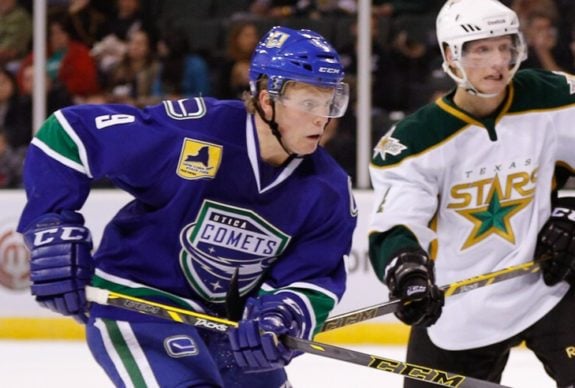
After two average seasons in the American Hockey League (AHL) with the Utica Comets and one uneventful game with the Canucks, he was traded in 2016 to the Calgary Flames for Markus Granlund. He played parts of three seasons with the Stockton Heat and 14 games with the Flames before getting traded again in 2018 to the Montreal Canadiens for Kerby Rychel. He played the entire 2018-19 season with the Laval Rocket, generating only five goals and ten points in 54 games.
Shinkaruk changed teams again in 2019-20 when he signed a one-year contract with the Carolina Hurricanes. Again, he never saw any NHL action, and only played 20 games for the Charlotte Checkers before leaving North America to sign with Kunlan Red Star of the KHL. He has now moved on to Dinamo Riga for the 2021-22 season.
For whatever reason, Shinkaruk just couldn’t catch on in the NHL. His defensive game was lacking at times, and he never could string together a strong set of games where he was a factor offensively. Even in the AHL, his career-high was only 21 goals, which is usually a red flag for future success at the highest level. In the end, the Canucks probably would have been better off if they selected home-town boy Shea Theodore, who was chosen by the Anaheim Ducks one pick later.
10. Nicklas Jensen (2011, 29th overall)
31 NHL games played (3 G, 3 A, 6 PTS)
Similar to Shinkaruk, Nicklas Jensen was once a highly regarded prospect in the NHL. During his draft year, he was even compared to power forward Rick Nash who was a perennial 30-goal scorer in the league.
Despite teasing Canucks fans with his elite speed and wrist shot, Jensen never really gained any traction in the NHL. He even played some shifts with the Sedins, and he still couldn’t catch fire. He ended up only scoring three goals and six points in 24 games with the Canucks before being shipped off to the New York Rangers in 2016 for Emerson Etem.
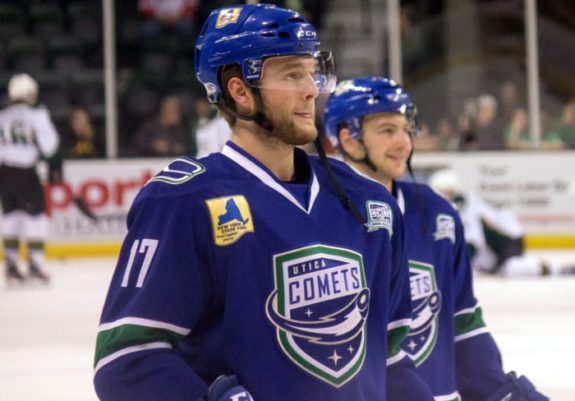
Jensen’s combination of size, speed, and shooting ability should have been enough to succeed, but ultimately he never did. After scoring a career-high 32 goals and 55 points with the Hartford Wolfpack of the AHL in 2016-17, he signed with Jokerit Helsinki of the KHL. He has played the past five seasons there, scoring 73 goals and 132 points in 183 games.
In the end, the 2011 Draft was not kind to the Canucks as there are no players in the NHL right now from that class. It hurts even more when you see that Nikita Kucherov, Rickard Rakell, Boone Jenner, William Karlsson, and Brandon Saad all were still available when they made their way up to the podium.
9. Brendan Gaunce (2012, 26th overall)
118 NHL games played (6 G, 10 A, 16 PTS)
Brendan Gaunce was yet another first-round pick that did not live up to his draft position. Despite playing 118 games in the NHL, he never really realized his potential as an elite two-way power forward. His character, work ethic, and leadership abilities impressed general manager Mike Gillis so much that he even called him a future captain of the Canucks.
Everything about him is good…good parents, good potential, good leadership. Captain material. Lots of character and a hard worker. There’s a really good foundation, and if we can do something with it, we think we’ll have a player.
Former Canucks GM Mike Gillis (from ‘Vancouver Canucks key on character, take Brendan Gaunce with their top NHL draft pick’, Vancouver Sun – 6/23/12)

Unfortunately, that prediction never came true, as Gaunce only ever developed into a solid depth option in the bottom-six. After 117 games with the Canucks, he became an unrestricted free agent (UFA) in 2019 after they decided not to extend him a qualifying offer. He subsequently signed a one-year contract with the Boston Bruins and is now toiling in the AHL with the Providence Bruins. He only played one game in the NHL in 2019-20 and 52 games in the AHL scoring 18 goals and 37 points.
8. Jake Virtanen (2014, 6th overall)
317 NHL games played (55 G, 45 A, 100 PTS)
Jake Virtanen has certainly grown a lot since his NHL debut in 2015. He started off great with 13 points in 55 games but regressed in his second season when he only played ten games before being shipped off to Utica. However, that season in the AHL was key to his development as he learned more about being a pro and got his first taste of future Canucks’ head coach Travis Green. The 2017-18 season was much brighter for the Abbotsford, BC native, as he made the team and played 75 games, scoring 10 goals and 20 points.
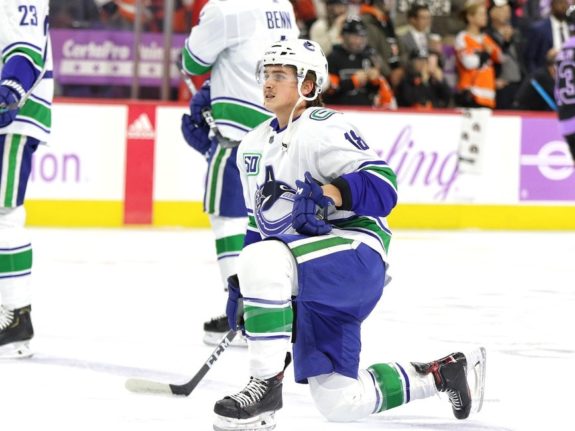
Since then, Virtanen has improved on his goal and point totals every season. The 2019-20 campaign was Virtanen’s breakout year, as he was on pace for over 20 goals. Unfortunately, that was not a sign of things to come as he regressed during the 2020-21 season where consistency and production were once again an issue for him. Then, on top of all that, he was accused of sexual assault and is now embroiled in a police investigation and civil lawsuit that may ultimately see the end of his career with the Canucks.
7. Olli Juolevi (2016, 5th overall)
23 NHL games played (2 G, 1 A, 3 PTS)
Olli Juolevi finally played his first NHL game (in the playoffs no less) and then appeared in 23 games during the 2020-21 season. Major injuries and the necessary rehab that followed have derailed his development a bit, but the fact that he’s only 23-years-old should give us all hope that he could still become a top-four defenceman. In the games he did play this season, he looked poised with the puck and meshed well with Tyler Myers on the third pairing. He also saw reps on the penalty kill, a strength he developed during his time in the AHL with the Comets. He did struggle towards the end of the season, but just the fact that he played some games and looked like an NHL defenceman is a reason for optimism in my mind.
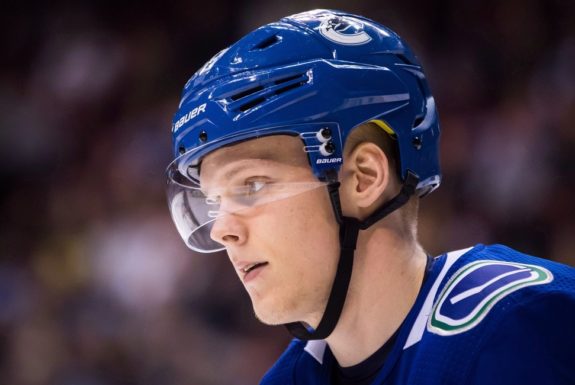
Juolevi has all the tools, now he just has to continue developing them at the NHL level. His ability to control the pace from the backend was one of the reasons why he was projected to go so high in the 2016 Draft. Unfortunately, he will never hit the heights of Mikhail Sergachev, Charlie McAvoy, and Matthew Tkachuk, which makes the pick all the more disappointing when you look back on it. He could still become a solid top-four defenceman, but never a top-pairing option, which is something many pundits predicted for him when he was drafted.
6. Vasily Podkolzin (2019, 10th overall)
0 NHL games played
If Vasili Podkolzin reaches his potential, he will definitely be moved up on this list. Until then, he will remain behind all the players that have already made an impact in the NHL. Teams were scared away from him because of the “Russian factor”, but Benning took a risk that I believe will ultimately pay off in the end. He is finally at the end of his two-year KHL commitment with SKA St. Petersburg and is poised to make his debut in the NHL as soon as the 2021-22 season. This is an exciting development, as he has all the tools to become a very effective power forward with the Canucks.
Podkolzin’s in-your-face game and impressive speed and puck skills should be a welcome sight alongside the finesse game Elias Pettersson provides. After his slow start in the KHL, there were legitimate concerns about the way his development was going, but once he started to produce, those concerns quickly faded away. He ended the season with his first two goals and was a force in the playoffs before the COVID-19 pandemic shut everything down. He then continued to produce in his final season in the KHL, where he posted five goals and 11 points in 35 games. Then, came the playoffs where he shone to the tune of six goals and 11 points.
Armed with a brand new entry-level contract, Podkolzin is ready to bring his game to the NHL and the Canucks’ top-six. If he can translate all his skills to the next level, they will have a beast who can play effectively in every zone and step up in key moments, something he displayed often in the KHL Playoffs and with Team Russia. He is already a fan favourite in Canucks Nation and will continue to be for the next decade.
5. Jared McCann (2014, 24th overall)
353 NHL games played (66 G, 89 A, 155 PTS)
If Benning believed in speed and finesse on the backend back in 2016, he would not have traded the promising Jared McCann for the slow-moving Erik Gudbranson. Alas, he did and the Canucks now have to watch him have success on another team. It took a few seasons and another trade to make that happen, but he is definitely looking like a legitimate top-six forward right now.
Related: Revisiting Jim Benning’s Drafts – 2014
It wasn’t like McCann didn’t have a positive experience with the Canucks when he made the team out of training camp as a 19-year-old. He scored nine goals and 18 points in 69 games while flashing his elite wrist shot and impressive speed in the process. Many Canucks fans and media pundits thought he was going to be a key part of the impending rebuild along with fellow 2014 first-round selection Jake Virtanen. I guess it just wasn’t meant to be, as Benning thought size and toughness trumped skill and speed.
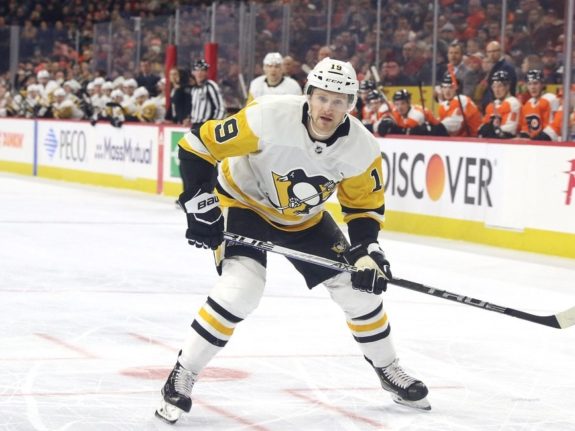
McCann is now with the Pittsburgh Penguins after being acquired in a trade along with Nick Bjugstad for Derick Brassard and Riley Sheahan. In 141 games since the move from the Florida Panthers, he has 39 goals and 84 points in 141 games, and at 23-years-old, he is only going to get better. Suffice it to say, he is the one that got away for the Canucks.
4. Brock Boeser (2015, 23rd overall)
253 NHL games played (98 G, 112 A, 210 PTS)
Now we get to the cream of the crop, starting with Brock Boeser, aka “The Flow.” Selected all the way down at 23 in the 2015 draft, I don’t think anyone expected him to outscore 15 of the 22 picks selected ahead of him. Ever since he entered the NHL after a very successful college career with the University of North Dakota, he has looked like a legitimate top-line forward for the Canucks. Despite some injury concerns after his Calder-worthy rookie season, he has become a huge part of the offence in Vancouver. He already has three 20-goal seasons under his belt and was on pace to record another before the 2019-20 season was paused and ultimately canceled.
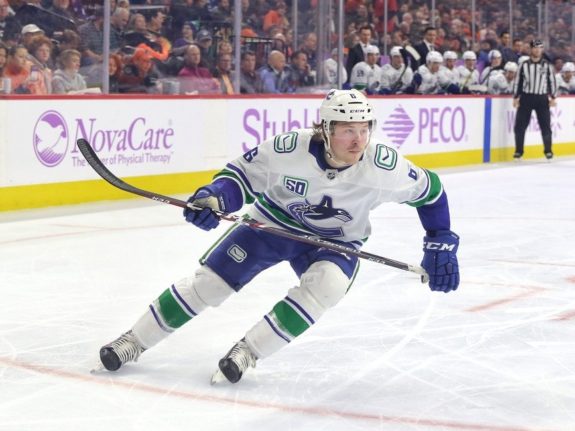
Boeser doesn’t only score goals, he also is an underrated playmaker with an innate ability to drive play when he’s on the ice. Without him, the Canucks just don’t look like the same team. The 2020-21 season was by all accounts his coming out party as he looked every bit the Calder Trophy nominee he was during his rookie season. His shot and one-timer were once again of the lethal variety as he posted 23 goals and 49 points in only 56 games and more importantly, he finally looked healthy after struggling with wrist and back injuries. Another member of the team’s under-25 brigade, he will be a key part of the bright future they are putting together on the West Coast.
3. Bo Horvat (2013, 9th overall)
502 NHL games played (139 G, 175 A, 314 PTS)
After essentially being acquired in the trade that sent promising goaltender Cory Schneider to the New Jersey Devils, Bo Horvat has become the heart and soul of the Canucks. Dubbed as a future captain when he was drafted ninth overall back in 2013, he has done that and a whole lot more in his six seasons in the NHL.
Despite being labeled by many scouts as a two-way third-line center with leadership qualities in his prime, Horvat has gone on to shatter that ceiling and is now one of the NHL’s top two-way forwards. He was also said to lack foot speed, although when he entered the league at 19-years-old, skating was one of his strengths, as his speed and acceleration were very evident in his rookie season.
Horvat is a player you win Stanley Cups with, as he embodies all the qualities of a winner. He plays in all situations, takes and wins an insane amount of faceoffs (850 with 57.3 percent success rate in 2019-20) while also scoring goals and matching up against the opposition’s best players. He also rarely misses a game, and already has four 20-goal seasons to his credit. He basically does it all for the Canucks, so it’s no wonder that they named him captain at the beginning of the 2019-20 season.
Related: Canucks’ Horvat Carrying Sedin Legacy
In the end, Horvat is one of the most important pieces on the Canucks right now. His leadership on and off the ice has been well-documented. From his part in the Black Lives Matter pause during the 2020 Playoffs to dealing with the pandemic that ravaged the locker room in 2020-21, he is the definition of character and class. Suffice it to say, the Canucks got a heck of a player and person when they drafted him ninth overall back in 2013.
2. Elias Pettersson (2017, 5th overall)
165 NHL games played (65 G, 88 A, 153 PTS)
It only took 13 minutes and 48 seconds for Elias Pettersson to show the entire hockey world that he was one to watch. His dash down the right-wing and subsequent snipe over then-Calgary Flames netminder Mike Smith was a thing of beauty. His facial expression afterward was even more special, as he nodded his head almost saying, “I could get used to this”. That goal was the first of many he has put on the highlight reel over his 165 games in the NHL.
The show he put on during his Calder-winning 2018-19 season not only brought fans back to Rogers Arena, but it also breathed life back into a fan base that was close to flatlining. Yes, they had the snipe show that is Boeser and the two-way grit of Horvat, but Canuck Nation needed another creative and finesse player that could get them on the edge of their seats, wondering what was going to happen next. Pettersson does this and a whole lot more with his laser-accurate shot, soft hands, vision, and otherworldly hockey IQ. It’s no surprise that his nickname is “The Alien.”
The 2019-20 season was much of the same, as he matched his 2018-19 output in three fewer games. His 27 goals was tied for the team lead with fellow star J.T. Miller and he finished second in points with 66, and at 22-years-old, the best is still yet to come for the man they call Petey. He may have struggled with injuries during the 2020-21 season, but he still put up 10 goals and 21 points in 26 games. If he was healthy all season, I’m sure he would have hit 20 goals again.
1. Quinn Hughes (2018, 7th overall)
129 NHL games played (11 G, 86 A, 97 PTS)
After much internal debate, Quinn Hughes has been selected as the best draft pick of the 2010s. Pettersson surely deserves this honour as well, but when you look at how difficult it is to find an elite puck-moving defenceman like Hughes, you can see why he could be more valuable in the long run.
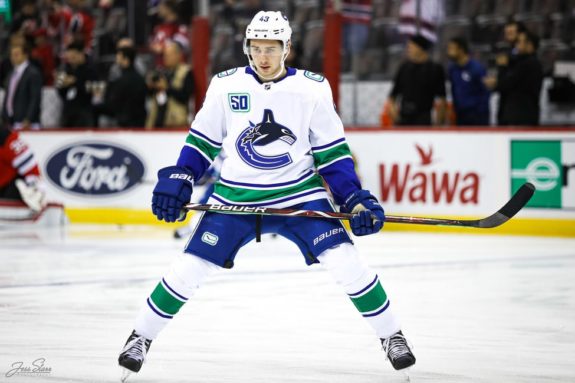
When you look at what Hughes has accomplished in his short career and what he has done to transform the look of the Canucks’ defence, it’s hard to believe that he only has two NHL seasons under his belt. From the minute he stepped foot on the ice, you knew he was going to be something special. The skating, vision, and unparalleled hockey sense are things that you won’t find in a Canucks defenceman again for a long time. So we should all count ourselves lucky to be able to witness his brilliance first-hand.
Hughes not only transformed the Canucks’ defence, but he also transformed the power play as well. After much debate and complaining on social media, the fans finally got their wish, and ever since he started running it, he has three goals and 43 assists with the man advantage. The way he walks the line and sets up chances for tips and one-timers while also being able to unleash his own underrated slap shot has made all the difference between a mediocre power play and an elite one.
On top of all his offensive exploits, Hughes has also contributed to the defensive side by driving play and getting the puck quickly and efficiently out of his own zone and through the neutral zone (from ‘By the numbers: Quinn Hughes is already the Canucks’ best neutral zone defender’, The AthleticNHL – 4/25/20). Not all defence is blocking shots and being physical, the best type is not allowing the opposition to be in your zone at all, and he rarely gets caught there when he has the puck on his stick. He either skates it out or executes a perfect pass to a forward rushing up the ice.
It doesn’t take long to realize that Hughes is a major part of the Canucks’ future. His 53 points in 68 games are just the beginning of many more seasons of dominance. If he can continue to grow, and I have no doubt that he will, he has the chance to become one of the all-time best defencemen in Canucks history. I would say that’s worthy of first place on this list.
Final Thoughts
The last ten years of first-round draft picks have taught us one thing, you can’t always hit a home run. However, since 2013, the Canucks have come away with core pieces in Horvat, Boeser, Pettersson, and Hughes while also adding complementary pieces in Virtanen and potentially Juolevi along the way. I would say that’s a pretty successful decade when you compare it with the mediocrity of the 2000s.
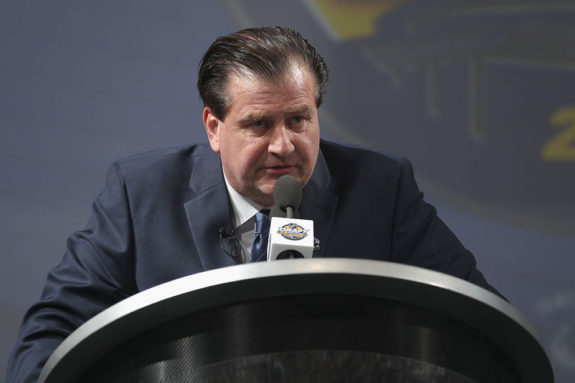
With that said, the Canucks were a much better team during that decade having selections at the bottom part of the draft rather than the top. In the 2010s, they had six picks in the top ten while in the 2000s they had only two, so that should factor into the comparison. Though, that should not discount the amount of success they have had recently with their first-round picks. If all goes according to plan, the 2010s could be the decade that produced the core of a Stanley Cup champion, and that’s all Canuck Nation has wanted for 50 seasons and counting.